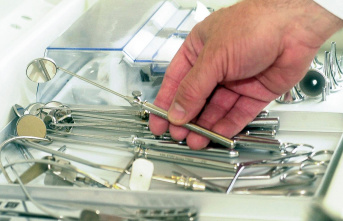Two young people died, five were injured and many had to watch the knife attack on a regional train from Kiel to Hamburg on Wednesday. The 33-year-old Ibrahim A. was arrested minutes after the deadly attacks on the platform of Brokstedt (Steinburg district). On Thursday, a judge issued an arrest warrant for stateless Palestinians. The charge is two counts of treacherous murder and four counts of attempted manslaughter.
Ibrahim A. is not in custody for the first time. Shortly after the crime in the regional train, it became known that he had only been released from the pre-trial detention department of the Hamburg-Billwerder correctional facility six days earlier, on January 19 – although a final decision had not yet been made on his case. Why was A. released anyway?
The then 32-year-old was arrested in Hamburg at the beginning of last year. On January 18, 2022, under the influence of alcohol and drugs, he is said to have hit a man in front of a Diakonie residence for homeless people and seriously injured him with a jackknife (blade length 10.5 centimeters) and then stole groceries in an Aldi market. On January 22, 2022, the district court of Hamburg issued an arrest warrant against the homeless man at the time. He came to Billwerder.
A. remained there until his trial at the Hamburg-St.Georg district court on August 18, 2022. The court sentenced Ibrahim A. to one year and one week in prison for dangerous bodily harm and theft - without probation. The verdict is before the star. It states, among other things, that the convict lacks a "favorable social prognosis". "The court does not see the probability of future impunity as greater than the probability of new crimes." A. also has "no viable network" in Germany. After the guilty verdict, Ibrahim A. went back to Billwerder.
He was not transferred to a regular prison because shortly after the district court's verdict, he appealed to the next instance, the regional court. The sentence to one year and one week in prison did not become final - but A. was not released anyway.
Although there was no date for the appeal process, A. remained in custody. It is expressly not a punishment, but serves to secure the court proceedings, for example by preventing the accused from going into hiding or destroying evidence. A judge must impose pre-trial detention.
Normally, pre-trial detention lasts a maximum of six months, only in exceptional cases longer. On January 19, 2023, Ibrahim A. spent a total of 363 days in the Billwerder detention center without a final judgment. In addition: In the appeal process, a higher judgment than the district court imposed 372 days according to the Code of Criminal Procedure would not be possible. There it says: "The judgment may not be changed to the detriment of the accused in terms of the type and amount of the legal consequences of the act (...)."
On the 363rd day of detention, the Hamburg district court lifted the arrest warrant - Ibrahim A. was a free man, six days later he boarded the regional express in Kiel towards Hamburg.
The duration of his pre-trial detention threatened to exceed the sentence of the district court in a few days. Longer detention would therefore have been "disproportionate", explained court spokesman Kai Wantzen in several interviews. Proportionality is one of the central principles of the rule of law. Since Ibrahim A. was not released from prison but from pre-trial detention, conditions were out of the question for him.
The crimes in Hamburg were not the first crimes committed by A. after his arrival in Germany on Christmas Eve 2014. He already had a criminal record, also for dangerous bodily harm. Federal Interior Minister Nancy Faeser (SPD) said during her visit to Brokstedt that it had to be clarified "why people who are so violent are still here in Germany".
Sources: Hamburg Court Press Office, Code of Criminal Procedure, DPA news agency











